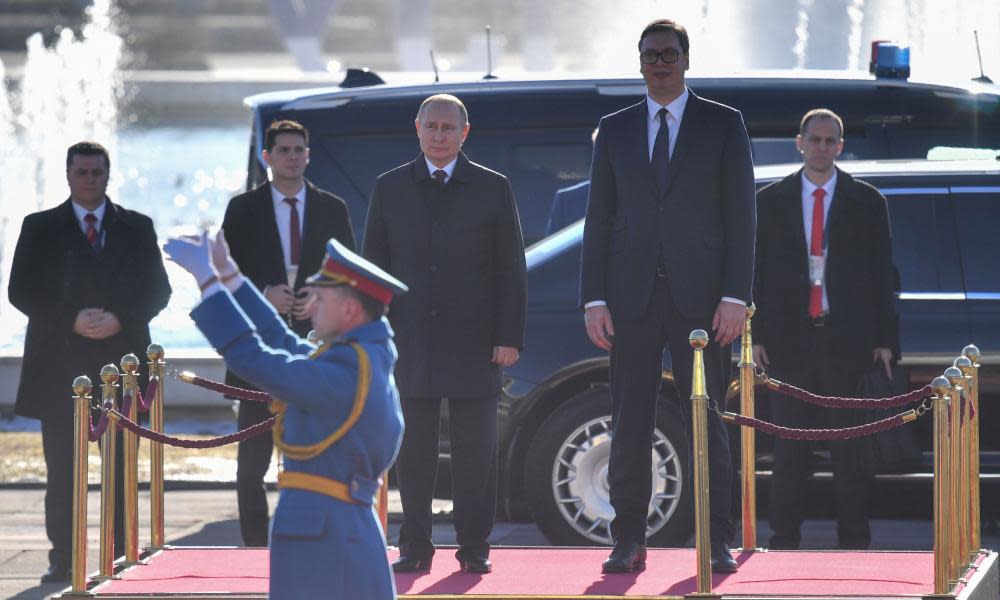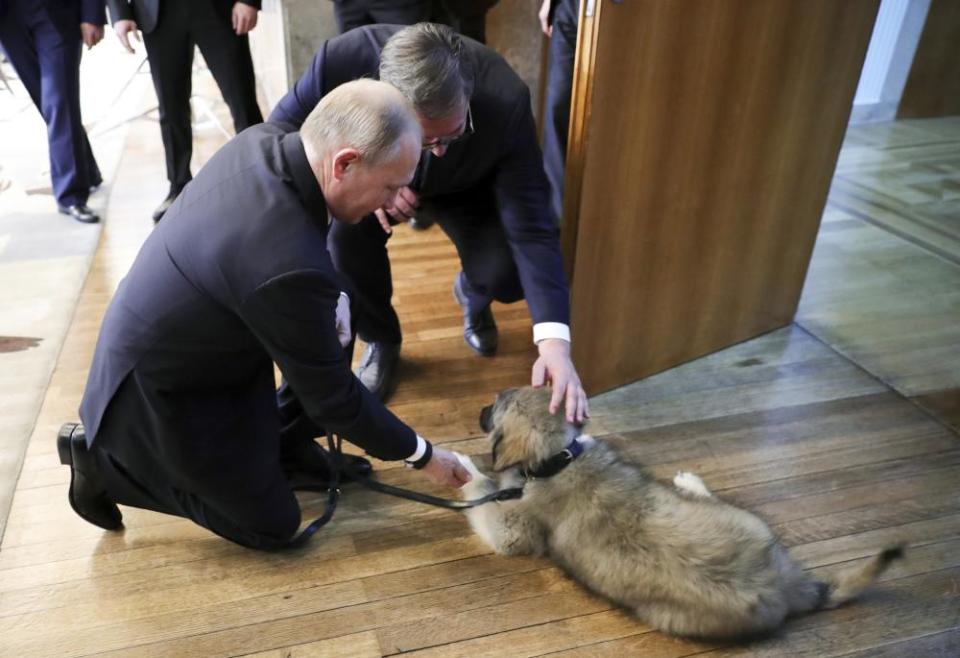Putin gets puppy and hero's welcome on Serbia trip

Serbia gave Vladimir Putin a hero’s welcome on Thursday as the Russian president’s plane arrived in Belgrade escorted by an honour guard of MiG-29 fighter jets that he recently donated to the country.
“I’m delighted to be able to visit friendly, brotherly Serbia,” Putin told the Serbian leader, Aleksandar Vučic, at the airport. Ceremonial cannons fired and church bells rang out to herald Putin’s arrival, and billboards posted around the city bore Serbian and Russian flags.
For Putin, who presented Vučić with a high state award during the visit, it was a chance to shore up one of the few strong bilateral relationships Russia has in Europe and reinforce Moscow’s claims to maintaining influence in the Balkans.
“Although Serbia is not a very large country geographically, you can rely on us,” Vučić told Putin before the pair went into talks.
In a ceremony, Putin presented Vučić with the Order of Alexander Nevsky, which in the past has been awarded to the autocratic leaders of Kremlin-friendly, post-Soviet countries. The bonhomie continued as Vučić gifted Putin a Sarplaninac puppy.

Putin is popular in Serbia, where Russian opposition to the Nato bombing of the country in 1999 and the subsequent independence of Kosovo is still recalled fondly.
Vučić, a former nationalist firebrand who now styles himself as a westerniser, has played a delicate balancing act in recent years, courting Europe while attempting to maintain good relations with Moscow.
In interviews with Serbian media on the eve of his visit, Putin lashed out at the west for trying to push Russian influence out of the Balkans. “The policy of the United States and some other western nations aimed at asserting their dominant role remains a serious destabilising factor here,” he said.
Western nations have expressed unease at what they believe to be Russian meddling in the region, including an apparent coup attempt in Montenegro, attempts at destabilisation in Bosnia and a humanitarian centre in southern Serbia that some western intelligence agencies believe has been a front for spying.
Putin claimed the EU was forcing Serbia to make an “artificial choice” between Moscow and the west. He complained about the expansion of Nato into the Balkans, with Montenegro joining the military alliance in 2017 after a knife-edge referendum, and Macedonia now closer to joining after recently ratifying an agreement to change its name to North Macedonia and end a long-running dispute with Greece.
Vučić, in an interview with the Guardian in Belgrade last year, said Serbia’s priority was further integration with the EU but that he wanted to maintain warm relations with Putin.
“We are militarily neutral, we have no aspirations to join either Nato or the Russian alliance,” he said. “We have a good relationship with Russia and we have no problems with Russia but we are on our EU path.”
The big issue for Vučić and Putin to discuss on Thursday was an EU-brokered settlement between Serbia and Kosovo, possibly involving an exchange of territories, that Vučić has been attempting to sign with his Kosovan counterpart, Hashim Thaçi. Both leaders are keen to sign a deal despite widespread opposition among their populations and unease among much of the international community about redrawing borders.
The deal is likely to involve Serbia acknowledging Kosovo’s independence without formally recognising it, and would pave the way for Kosovo to join the UN and for both countries to join the EU. However, Russian support is crucial given its veto on the UN security council, and Putin may not support a deal that moves Serbia further along the path towards EU integration.
Putin’s visit comes amid a series of large-scale protests against Vučić in Belgrade. There were suggestions that the Serbian government was organising pro-Putin rallies in Belgrade on Thursday in an attempt to show it could also mobilise supporters, with the newspaper Jużne Vesti claiming that government workers in the southern city of Niš were being bussed into the capital to attend rallies.

 Yahoo News
Yahoo News 
